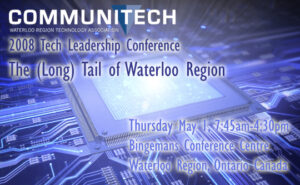
6 May 2008
Tech Leadership Redux
I finally found some time to record thoughts on a great conference – last Thursday’s Tech Leadership Conference (TLC) by Communitech. CEO ROUNDTABLE: Verdexus once again gathered a few tech CEOs from Waterloo and Toronto, the night before at Charbries, to have an informal and open-ended discussion of key issues in financing, growing, valuing and finding exits for technology startups. As in past years, we assembled an accomplished group who have built primarily software-based businesses during the last decade and are now executing newer models, whether SaaS or the more esoteric Venture 2.0 Playbook necessary for “so-called” Web 2.0 and Mobile businesses. In an earlier blog, I covered a past TLC speaker and Verdexus advisor Grover RIghter’s Venture 2.0 Playbook. Numerous war stories about increased complexities of dealing with founders, VCs, groups of angel investors, not to mention simply making enterprise sales highlighted common success factors of perseverence to overcome obstacles, failure and experimentation before ultimate success and just plain good luck around timing. The drying up of VC money and other funding challenges remain a constant theme. Experience in building great businesses over the last ten years has a […]

4 May 2008
Tweets from #TLC Twitterverse
Ever since I attended AlwaysOn OnMedia NYC conference in January 2007, where I witnessed the unfolding of a parallel conference on large side-mounted LCD panels, I’ve been intrigued by the power of social media to enhance the traditional conference experience. That conference pioneered a new delivery approach, which attempts to exploit peer-to-peer discussions and even involve those outside the conference in the event itself. I’m convinced that, in the context of conferences at least, much of the power of the social media lies in creating a whole new back channel of discussion. In that way, conference attendees can network, take notes and make the conference as personal to their needs as they desire. The same thing was happening at the recent Communitech Tech Leadership Conference (TLC) in Waterloo on May 1st. In fact, when I made the suggestion to Iain Klugman (Communitech President) to consider installing those monitors for the next event, he was most enthusiastic. Nonetheless, while reflecting on the important, high level lessons from this conference, (which I plan to cover in a later blog posting), I did a quick mash-up of the main Twitter posts from TLC. […]

28 Apr 2008
Is There More to Early Adopters than the Next Big Thing?
In saying: “believe me, you have to get up early if you want to get out of bed” it’s not entirely clear that Groucho Marx was referring the much-vaunted early adopter of a previous post. Therein, I illuminated how important early adopters are and the hazards of miscuing when serving them in newly minted markets. Because of this, I thought I’d share a few personal experiences of what motivates me to adopt early. Of course, I’m a technophile, yet I’m hardly indiscriminate in my acquisition of new technologies. How do I decide where to focus my energies? Let’s start by looking at a few of the new technologies I didn’t adopt and why not, and discern some lessons from that. “The Ultimate Audiophile’s Turntable”British Audiophile Bible in the 1970’s and 1980’s Compact Disc As an audiophile in the 1970’s, I spent lots of time researching and purchasing hi-fi audio systems with a primarily primarily British lineage, including: high end turntable (Linn Sondek or Rega), cartridge (Supex), pre-pre-amp, pre-amp (Meridian, Naim or Tangent), amplifier, speakers (Harbeth), etc. I read the quirky “Hi Fi Answers”, patronized audiophile shrines like Ring Audio […]

19 Apr 2008
“The Third Place”: A Better Place?
Remember 1200 baud ModemsLatte from A Matter of Taste Cafe The Office Goes Home Over a short span of years, I’ve witnessed work migrate from a highly structured office setting, to home offices via telecommuting and now into the “Third Place”, a term coined by Ray Oldenberg in his 1989 book The Great Good Place. Back in the early 1980’s, I was a pioneer of telecommuting, between Waterloo and Chicago via a state of the art 1200 baud modem, pictured above, no less. There was intense interest in this at the time, because as an extremely early adopter (too early some might say) of the telecommuting paradigm, I felt a bit like a guinea pig. In retrospect this workstyle enabled extreme concentration and productivity. At the same time, the primitiveness of the communications technologies, from network speed to the software then available, necessitated a lot of travel for in-person meetings. And, tellingly, the home office can ultimately be a lonely workplace, leading to a decrease in social interaction and overall motivation. In that early revolution over the last 25 years, telecommuting saw work slowly migrate, or more typically intermingle, […]

12 Apr 2008
Early Adopters versus Business Models: Shooting Yourself in the Foot?
In an attempt to de-mystify seeming abstract business theory, from time to time, we will discuss “real world” examples of business models in action. Both theory and practice underscore the importance of keeping early adopters engaged with a new product or service, a key enabler for creating a hit in the mainstream market. Of course, such trend setters love to play and revel in all things new. More importantly, they are also disproportionately connectors and influence makers, who can make or break eventual success in any marketplace. The new science of social networks merely provides proof of our intuitive sense that these people are the number one key to success in new markets. To provide some historical context, a lack of serious engagement with application developers (a very specialized form of early adopter), penalized early Apple Macintosh market share, a failing which took nearly 20 years to put right! Thus, do people running both startups and major corporations, having learned this lesson, live and breathe attention to early adopter crowd? Hardly. Below are two glaring examples, sadly (or perhaps tellingly), both involve the same major Canadian wireless carrier. Both involve […]

9 Apr 2008
Science Fairs, Social Media & Fads – The New Science for the 21st Century
Last week, my son Devin Howard (a Grade 12 student, pictured above) won a Gold Medal at Waterloo-Wellington Science and Engineering Fair, enabling him to go on to the Canada-Wide Science Fair, run by Youth Science Foundation, in May at the University of Ottawa. His topic, for which he developed a computer model written in multi-agent, graphical modelling and simulation language called NetLogo, was to study the propagation of ideas such as fads or partisan political persuasion using some of the latest social graph theories. Last summer, at the acclaimed Shad Valley program at University of Calgary, he became interested in the topic of emergence. For those who are not familiar with this fascinating field, emergence can be defined as as “… the way complex systems and patterns arise out of a multiplicity of relatively simple interactions.” From that springboard, he became interested in the way fads and other changes propagate through society, especially illustrated by recent books like Malcolm Gladwell’s The Tipping Point. (An interesting footnote is that Gladwell, now based in New York City, grew up right around the corner in the small community of Elmira). Gladwell, a […]

3 Apr 2008
The World is Flat: Technology, Globalization and Cultural Paradoxes
The world is indeed a strangely fascinating place. Technological forces have recently flattened the world, making the global village predicted by Marshall McLuhan way back in the early 1960’s a reality. Nicholas Negroponte’s highly publicized One Laptop Per Child project aside, the mobile phone is uniquely the one technology that has both gained traction and been as transformational in the developing world as in the west. With that in mind, RoryStewart’s The Places in Between brilliantly captures the cultural melange that is modern Afghanistan. Having recently completed this book left me with a much richer understanding Afghanistan’s position as the “missing link” among European, Chinese and South Asian cultures, religions and history. Stewart, as a historian, and fearless trekker, captures the absurdities inherent in the American/NATO invasion, especially as they compound attempted occupations by Russia, colonial Britain and before them a long line going back even before Alexander the Great. I’d strongly encourage people to read this book. In this context of historical and cultural dissonance, it was sadly amusing to read the following line about a small tribal village that retains its own language and culture and is (supposedly) […]
13 May 2008
Startups: A History of Location
In today’s knowledge-based economy, much discussion centres around the importance of clustering. For example, in financial services, cities like New York, London and Toronto have all benefited at the expense of smaller rivals (eg. Philadelphia, Paris and Montreal or Vancouver). Likewise, as entrepreneurial technology startups have spread around the world, the Silicon Valley remains a magnet and model for that magic blend of people, ideas and capital aspiring to create the next Microsoft or Google. Furthermore, in spite of the world-flattening ascendency of information technology over the last decade, in some ways, the forces of such clustering seems to have increased.Being domiciled in Canada, and having built transatlantic technology companies over the years, led me to ponder Chris Anderson‘s recent endorsement of distributed workface in which he “builds companies that are distributed because that’s where the best people are.”So, what’s the stronger force: clustering or distributed teams? First, let’s dig a bit into history so we can follow this trend.The 1980’s: Selling Software in a Pre-web WorldIn the late 1980’s, an otherwise bright, young MBA student advised MKS to conquer local markets (ie. Waterloo Region) before going national and only […]